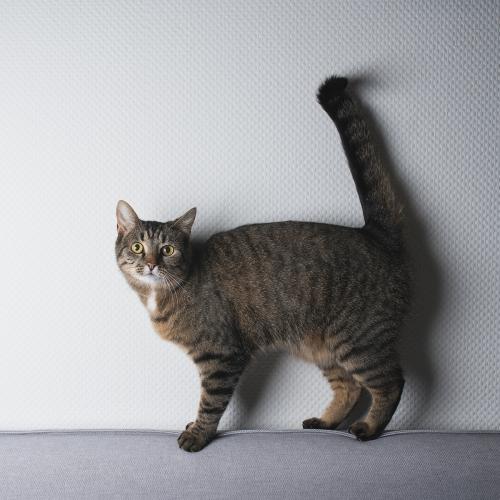
Even when domesticated, cats retain some wild animal instincts — such as marking their territory. As long as your pet is content with rubbing against walls and objects, no problem. But if it feels the need to mark its home with its claws and urine, things become more complicated. Here are a few tips to better understand these habits and manage undesirable behaviours.
Rubbing and claws
Felines have scent glands on their cheeks, paws and flanks. When they rub against a door or a wall, it is to permeate the object with their smell in order to familiarise themselves with it and as a warning to other animals. In the same way, cats that rub affectionately against their owner’s legs send the message that the person is “their human.”
When cats sharpen their claws, in addition to sharpening for their well-being, they are also marking the surface with their odour as a sign of ownership. Since this habit can damage property, it is best to manage it by training your pet to use a scratching post .
Territorial marking or urinary problems?
To more clearly mark their territory, cats can spray their urine. The way they do this is very distinctive: back to a vertical surface, tail up (sometimes shaking it), and spraying urine.
However, if your cat pees lying down outside the cat litter, this could be a sign of a medical problem. If your pet has difficulty urinating or can’t urinate at all, this could signal a serious problem requiring an emergency visit to the veterinarian. In more severe cases, there can be permanent health effects in just a few hours or even death.
Spaying or neutering your kitten: The best prevention
The need to mark their territory with urine is mostly present in cats that aren’t sterilised, in particular males. The best way to prevent the problem is to spay or neuter cats before they reach sexual maturity. The longer we wait, the higher the risk the animal will maintain the habit even after surgery.
Identify and clean the areas marked with cat pee
The areas sprayed with urine have to be thoroughly cleaned with a special enzymatic cleaner. Most domestic products don’t make the smell completely disappear, and their strong smell might make your cat want to mark its territory again.
If certain spots are repeatedly marked, limit access to them by closing the door to the room. If this isn’t possible, instead set some food out and play with your cat. Your pet will then perceive this area as a spot to eat and play, diminishing the urge to urinate.
Using cat pheromones
Installing a feline pheromone diffuser is another solution. Sold as a spray or a plug-in device, it circulates a scent that is odourless to humans in the air, but is calming for your furry friend. The product sends the signal that “all is well”, and your cat will no longer feel the need to mark its territory.
Territorial marking as a sign of stress
Cats can feel the need to mark their territory as a reaction to stress, such as the arrival of a new pet or member of the family. Watch out for other signs of anxiety and don’t hesitate to talk to a veterinarian for further help.
Tips & Tricks
- Here are some tips to ensure your guests know how to interact with your dog during the Holiday season.
- Here are some tips to ensure a more pleasant stay for your friends and family with cat allergies.
- Do you know what pet insurance can cover? Here’s how it works.
- Contrary to dogs, cats have a profound hatred of costumes. Here’s why.
Products
- Zentonil®, to help support the cognitive function of aging pets, will help when your pet's liver is compromised…









